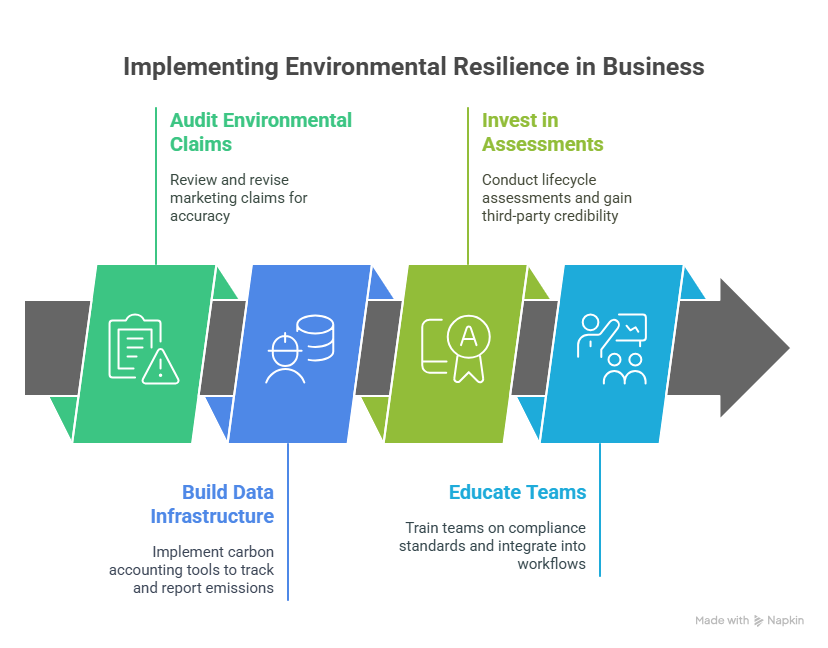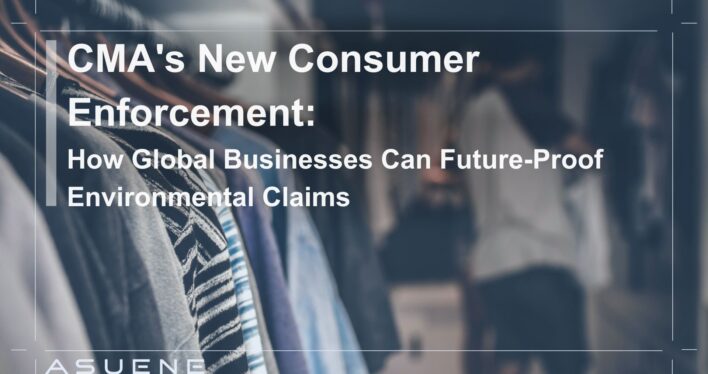- Article Summary
-
Overview
In 2024, the UK’s Competition and Markets Authority (CMA) gained new enforcement powers through the Digital Markets, Competition and Consumers Act. While the law covers a range of consumer protections, one area is under especially intense scrutiny: environmental marketing and sustainability claims.
For global businesses, from tech to retail to manufacturing, this marks a new compliance frontier. Regulators are now demanding hard evidence behind every “green” promise. Those who can’t prove it face fines of up to 10% of global turnover, reputational fallout, and consumer distrust.
Greenwashing Is Now a Regulatory Risk
The CMA’s updated guidance targets misleading or vague environmental claims, especially those that influence purchasing decisions without being evidence-based. This aligns with similar efforts in the EU’s Green Claims Directive and by the US FTC.
Key risk areas include:
- Carbon Neutrality Claims: Unsupported carbon neutral timelines or lack of data on offsets/emissions boundaries
- Generic Eco Labels: Using terms like “sustainable,” “eco,” or “climate-friendly” without context or certification
- Omissions and Overstatements: Highlighting one green attribute while ignoring larger environmental harms

Why Environmental Data Integrity Matters
To avoid regulatory risk and build lasting trust, companies need to make sure their environmental claims are backed by solid evidence. First, every claim should be based on real numbers. This means using carbon accounting systems that follow global standards and include all relevant emissions—from direct operations to the full supply chain.
Next, the data should be checked by a trusted third party. Independent audits and certifications, like those from ISO or CDP, help prove that the information is accurate and reliable.
Finally, businesses should look at the entire life of a product—not just one part of it. A full lifecycle assessment (LCA) shows the total environmental impact, from raw materials to disposal.
When companies take these steps using accurate data, getting it verified, and showing the full picture, their environmental claims become clear, trustworthy, and ready to meet UK and EU rules.
Steps Global Businesses Should Take Now
- 1. Audit All Environmental Claims in Marketing and Labels: Identify any vague or unsubstantiated language and remove claims that can’t be proven with data
- 2. Build a Carbon and Impact Data Infrastructure: Implement carbon accounting tools that track emissions across supply chains and continuously update data
- 3. Invest in Lifecycle Assessments and Certifications: Conduct LCAs for key products/services and gain third-party credibility to environmental performance
- 4. Educate Teams on Green Compliance Standards: Train product, legal, and marketing teams on the CMA’s guidance and EU/US equivalents and embed environmental substantiation into your compliance workflows

Conclusion
Environmental claims are no longer just marketing copy—they are legal declarations. In the UK, EU, and US, regulators are holding businesses accountable for what they promise about climate impact, sustainability, and circularity.
By grounding claims in real data like carbon accounting, lifecycle analysis, and independent verification, companies can future-proof their environmental positioning, reduce regulatory risk, and lead in a marketplace where green credibility is currency.
The most successful businesses in this new landscape will be those who can prove what they say, not just say what sounds good.
Why Work with ASUENE Inc.?
Asuene is a key player in carbon accounting, offering a comprehensive platform that measures, reduces, and reports emissions, including Scope 1-3, with expertise in decarbonization. Asuene serves over 10,000 clients worldwide, providing an all-in-one solution that integrates GHG accounting, ESG supply chain management, a Carbon Credit exchange platform, and third-party verification.
ASUENE supports companies in achieving net-zero goals through advanced technology, consulting services, and an extensive network.


